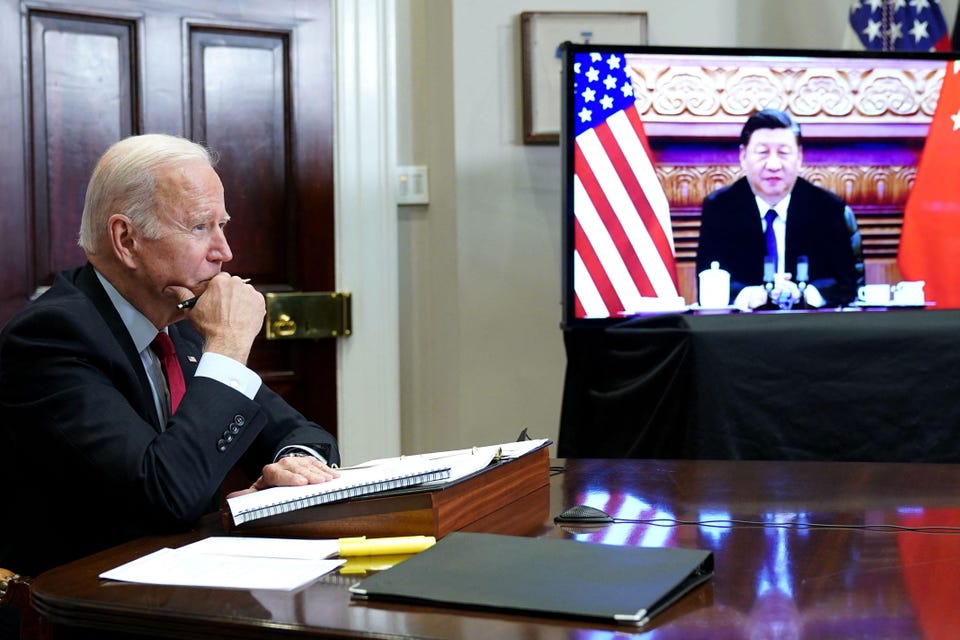Asia Editors’ Pick Biden And Xi Talk, But Not About The Global Economic Slowdown Vasuki Shastry Contributor Opinions expressed by Forbes Contributors are their own. I write about Asian economics and technology news. New! Follow this author to improve your content experience.
Got it! Jul 30, 2022, 08:15am EDT | Share to Facebook Share to Twitter Share to Linkedin U. S. President Joe Biden meets with China’s President Xi Jinping during a virtual summit from the .
. . [+] Roosevelt Room of the White House in Washington, DC, November 15, 2021.
MANDEL NGAN/AFP via Getty Images As Presidents Biden and Xi Jinping concluded their fifth round of virtual talks this week, one can’t help feel an overpowering sense of nostalgia to the real Cold War which ended decades ago. That war, between America and the USSR, at least, had powerful guardrails and a formal discussion platform to prevent the worst-case scenario of that era—nuclear holocaust. U.
S. -China relations, on the other hand, which geopolitical analysts insist are not on a new Cold War footing, are shaping out to be unpredictable because a simple conversation between the two leaders is preceded by elaborate diplomatic choreography to ensure that expectations are low, and ends with a pro forma statement that the dialogue was “substantive, it was in-depth, and it was candid,” as a senior White House official indicated on Thursday. For good measure, the Chinese side made similar noises by noting that “the two Presidents had a candid communication and exchange on China-U.
S. relations and issues of interest. ” Diplomats will object to my characterization that the U.
S. -China dialogue is all talk and little substance on the grounds that the two countries are keeping their communication lines open, a positive sign to prevent unintended consequences. But will it really? Since Russia’s invasion of Ukraine, China has doubled down in its support for Russia, a “friendship without limits,” as Beijing characterized it in February when Putin visited the Chinese capital.
China (and India) are also propping up Russia’s economy by buying huge quantities of discounted Russian oil, blunting the impact of western sanctions. China’s support for Russia diminishes the possibility of achieving a grand bargain deal between America and China in the near-term. There were some expectations of some convergence in U.
S. -China policies since Biden assumed power, in critical global public good areas like climate change and health. While these issues were once again referenced in the read-out from both sides after the call, China’s extreme approach in banishing Covid (which has lead to protracted lockdowns in major cities) and an increase in coal output to address persistent energy shortages reduces the possibility of an early agreement.
MORE FOR YOU China Detains Fallen HNA Ex-Billionaire Chairman Ahead Of Airline Restructuring Vote Nasdaq Listing Of Freshworks Creates Windfall For Indian Founder And Hundreds Of Employees Ninja Van Becomes Singapore’s Newest Unicorn After Raising $578 Million From Alibaba, B Capital Moreover, President Xi is going to be pre-occupied for the rest of the year in securing a third-term in office, which precludes the possibility of any Chinese flexibility in the near term. Indeed, China is deeply suspicious of America’s support for Taiwan. House Speaker Nancy Pelosi’s expected to visit Taipei shortly, which would be the highest level American official to visit the island since 1997, has again brought this issue to the fore.
Since Russia’s invasion of Ukraine, some analysts have posited that Beijing is harboring plans to eventually pursue a similar playbook by invading Taiwan. While such an invasion does not appear imminent, Taiwan will continue be an ongoing source of tension between the two countries. There is an urgent area for global cooperation, which the readout from the two sides did not touch on.
This week, the International Monetary Fund projected that global GDP growth for 2022 and 2023 is likely to slow further to 3. 2% and 2. 9%, respectively.
A major contributor to this slowdown is weak growth in America and China, two traditional growth engines of the global economy. There are several areas of disagreement between America and China, which is unlikely to be resolved anytime soon, but the global economy cannot wait until this happens. It is on life support.
The leaders of the world’s two largest economies need to showcase global cooperation by actively engaging through international forums—the IMF, G20—to ensure that there is a road map and financing available to deal with the current slowdown. Treasury Secretary Yellen did participate in the President’s call, along with her Chinese counterpart. The next logical step would be to demonstrate that the Cold War label notwithstanding, the two countries can actually work together for the common good.
Vasuki Shastry Editorial Standards Print Reprints & Permissions.
From: forbes
URL: https://www.forbes.com/sites/vasukishastry/2022/07/30/biden-and-xi-talk-but-not-about-the-global-economic-slowdown/



